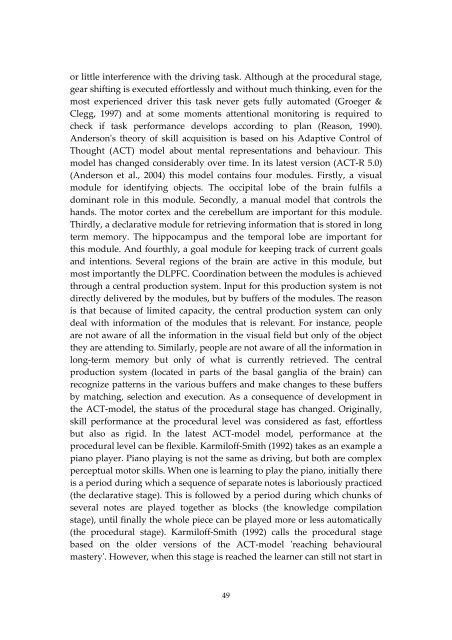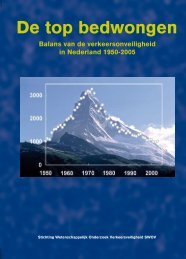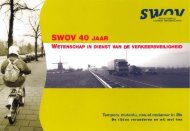Hazard anticipation of young novice drivers - SWOV
Hazard anticipation of young novice drivers - SWOV
Hazard anticipation of young novice drivers - SWOV
You also want an ePaper? Increase the reach of your titles
YUMPU automatically turns print PDFs into web optimized ePapers that Google loves.
or little interference with the driving task. Although at the procedural stage,<br />
gear shifting is executed effortlessly and without much thinking, even for the<br />
most experienced driver this task never gets fully automated (Groeger &<br />
Clegg, 1997) and at some moments attentional monitoring is required to<br />
check if task performance develops according to plan (Reason, 1990).<br />
Anderson's theory <strong>of</strong> skill acquisition is based on his Adaptive Control <strong>of</strong><br />
Thought (ACT) model about mental representations and behaviour. This<br />
model has changed considerably over time. In its latest version (ACT-R 5.0)<br />
(Anderson et al., 2004) this model contains four modules. Firstly, a visual<br />
module for identifying objects. The occipital lobe <strong>of</strong> the brain fulfils a<br />
dominant role in this module. Secondly, a manual model that controls the<br />
hands. The motor cortex and the cerebellum are important for this module.<br />
Thirdly, a declarative module for retrieving information that is stored in long<br />
term memory. The hippocampus and the temporal lobe are important for<br />
this module. And fourthly, a goal module for keeping track <strong>of</strong> current goals<br />
and intentions. Several regions <strong>of</strong> the brain are active in this module, but<br />
most importantly the DLPFC. Coordination between the modules is achieved<br />
through a central production system. Input for this production system is not<br />
directly delivered by the modules, but by buffers <strong>of</strong> the modules. The reason<br />
is that because <strong>of</strong> limited capacity, the central production system can only<br />
deal with information <strong>of</strong> the modules that is relevant. For instance, people<br />
are not aware <strong>of</strong> all the information in the visual field but only <strong>of</strong> the object<br />
they are attending to. Similarly, people are not aware <strong>of</strong> all the information in<br />
long-term memory but only <strong>of</strong> what is currently retrieved. The central<br />
production system (located in parts <strong>of</strong> the basal ganglia <strong>of</strong> the brain) can<br />
recognize patterns in the various buffers and make changes to these buffers<br />
by matching, selection and execution. As a consequence <strong>of</strong> development in<br />
the ACT-model, the status <strong>of</strong> the procedural stage has changed. Originally,<br />
skill performance at the procedural level was considered as fast, effortless<br />
but also as rigid. In the latest ACT-model model, performance at the<br />
procedural level can be flexible. Karmil<strong>of</strong>f-Smith (1992) takes as an example a<br />
piano player. Piano playing is not the same as driving, but both are complex<br />
perceptual motor skills. When one is learning to play the piano, initially there<br />
is a period during which a sequence <strong>of</strong> separate notes is laboriously practiced<br />
(the declarative stage). This is followed by a period during which chunks <strong>of</strong><br />
several notes are played together as blocks (the knowledge compilation<br />
stage), until finally the whole piece can be played more or less automatically<br />
(the procedural stage). Karmil<strong>of</strong>f-Smith (1992) calls the procedural stage<br />
based on the older versions <strong>of</strong> the ACT-model 'reaching behavioural<br />
mastery'. However, when this stage is reached the learner can still not start in<br />
49
















